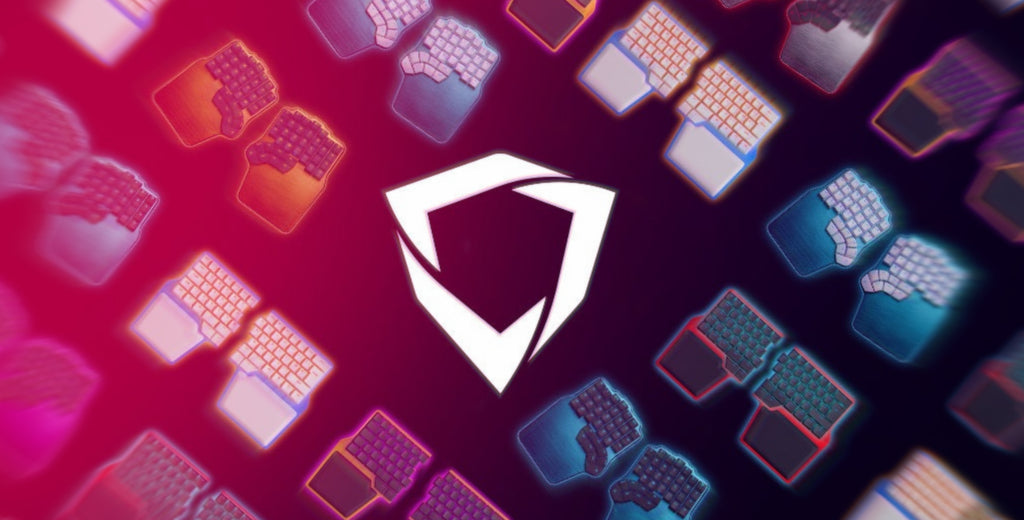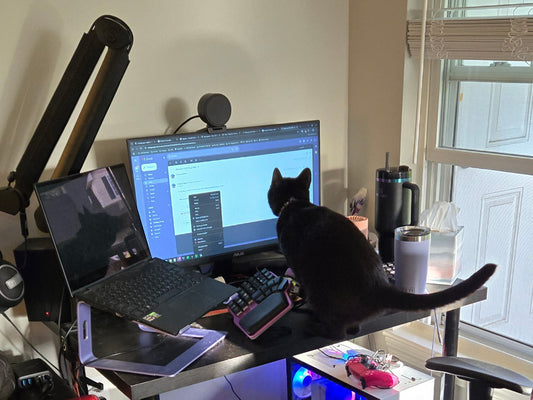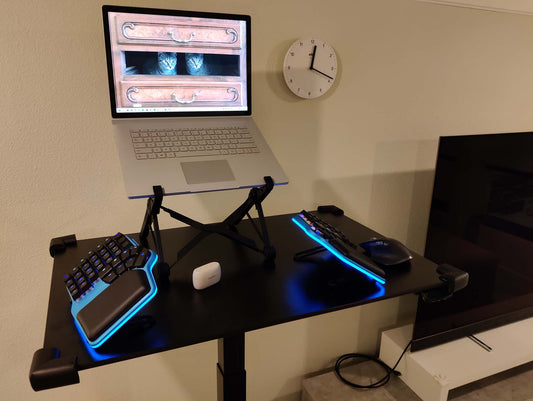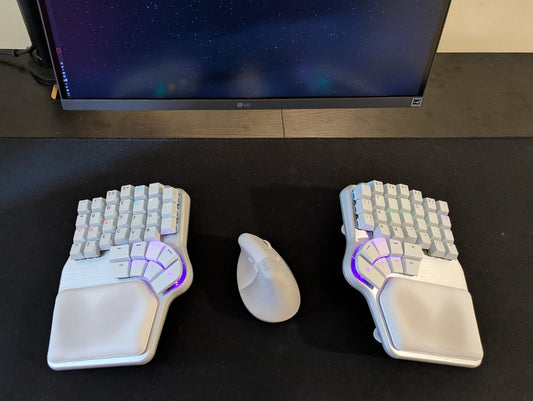What does it take to be a successful start-up? Innovation? Resilience? Strategic execution? And what makes Dygma successful? We started our year asking the same questions, which gave us the perfect opportunity to make a short recap of our story.
The Origins
Did you know that the founder of the Dygma Raise was actually a professional poker player?
He then became FNATIC's LoL coach, winning 2 European championships. But most importantly, he's now the CEO of Dygma - Luis Sevilla.

During his esports era, Luis found a gap in the market. He realized that, much like the players he trained, using computer keyboards for long hours on end led to neck, back, and wrist pain, and sometimes it even led to irreversible injuries.
He knew that the keyboard's design was highly outdated... But why hadn't anyone done anything to fix it?
In 2016-17, Luis decided to start his own company to create the first-ever ergonomic gaming keyboard.
The Shortcut was designed considering our hands and fingers' shape and natural motion. It had a columnar staggered layout and a particular design for the thumb keys, with joysticks everywhere.

However, after manufacturing 50 prototypes and testing them with users, it quickly became apparent that the learning curve for this product was too steep, so it never went into mass production.
What the market needed was rather an ergonomic keyboard that wasn't too far off from a regular good ol' keyboard.
A keyboard with a conventional layout that could be split in half to promote a better typing or gaming posture, with a thumb cluster to relocate high-frequency keys to our strongest finger, and a configurator software to create custom layers to make the most of your workflow.

Also, hot-swappable mechanical switches, a low-profile body, palm rests, and palm pads to help keep a neutral wrist angle were important to have.
Our First Quest: The Dygma Raise
To make this idea a reality, Luis had to have it crowdfunded, and they were able to raise almost half a million dollars.
After two successful crowdfunding campaigns from December 2017 to January 2018, they had enough resources to begin development.
It wasn't easy. A team of 4 (at some point 3) simply couldn't manage everything going on in this start-up. Each person was in charge of 3 or more departments at a time.

It came as no surprise that there were delays. What was supposed to be a campaign that would ship in 6 months ended up taking two years.
As they say, hardware is hard, and it's even harder when you have a detail-oriented perfectionist like Luis trying to create a product that has never been created!

From getting the perfect light distribution for the underglow, to making sure that there was not even a 0.2mm gap between the keyboard's halves to overhauling a major component of the keyboard, and the Neuron (formerly known as the Hubble).

We carried on development, designing, iterating, prototyping, failing, delaying, and learning.
We did what we could from our end to ensure that the components' design and quality were top-of-the-line. But the real hardships came from dealing with our suppliers in China.
The supplier madness

One component that set us back a lot was... not even a physical part of the keyboard. Surprisingly, it was the palm pads.
Creating the perfect palm pad was a constant struggle. After understanding the materials we wanted, our next challenge was to make sure the factory could make it all look perfect. By perfect, we meant the exact shape and functionality we wanted, but they couldn't provide it.

The edges were not cut smoothly, and the sides would rise slightly after use.
Even after we had already paid for the tooling machine to make the palm pads, we had to decide to find a new supplier. Setting up for a poor-quality component so that we could meet a 'deadline' was never even an option.
But that's not the end of the supplier saga...In June 2019, right before we had to assemble 10,000 PCBs, we changed PCBA factories.

To make matters worse, we kept failing the certification test for the electronics, which meant that we had to modify the cables and test, add more shielding, and test. These issues meant delays. And delays meant refunds.
Luckily, we didn't go bankrupt... and our community, the Dygmates, were simply awesome, patient, and understanding. But we knew we had to make up for it somehow, so we decided to create a travel case to come as a free add-on to the keyboard.
Final mass production and COVID times

Months later, in October 2019, Manel, our Product Manager, went to China to oversee the final mass production run. Soon enough, from December 2019 onwards, this $300 revolutionary keyboard was finally seen in setups of around 2,000 people who believed in the project.
Then, in March 2020, COVID hit.
Since everyone was working from home, we saw a sales spike, which was great! However, we ran out of stock, and since the whole world was on lockdown, we couldn't manufacture our second batch of Dygma Raise keyboards.
Thus, we had to go back to pre-sales and wait for COVID out until we were able to manufacture and ship again. In the meantime, more and more people started to learn about Dygma and the Raise.

Eventually, the team started to grow as well, and as soon as restrictions lightened, we were able to carry on with production. However, we faced more challenges, which resulted in us changing our quality control and shipping protocols. You can guess what the consequences of that were: massive delays again.
Because of travel restrictions, we couldn't fly to China to oversee production. We had to ship all keyboards to Spain to do the final quality control and, from here, ship them worldwide. Not only that, but production costs rose. Everything became more complicated and took more time. Nevertheless, we pushed on, and it all worked out fine!

In June 2020, we decided to offer free goodies with the Raise keyboard. These included the cleaning cloth, brush, extra switches, and O-rings.
Many months had passed, and we made improvements in the next mass-production batches, showing our never-ending quest for excellence. Softer palm pads, more compact travel case, redesigned keycaps, bigger rubber feet, and even sound-dampening solutions.
We were truly committed to giving the best to our Dygmates. Some of them expressed the need for a tenting kit to relieve the discomfort caused by hand pronation after long hours on the keyboard. We listened, and after a year of development, in June 2021, we launched the tenting kit as an add-on to the Dygma Raise.

It wasn't a free add-on this time, but our Dygmates were extremely happy. Too happy, as a matter of fact, that after the first day, we ran out of stock! We underestimated how many we were going to sell and had to make four batches in two years.
Plot twist: A Keyboard Startup's Worst Nightmare

The keyboards started to freeze and became unresponsive. The only solution seemed to be unplugging and replugging them. We had no idea where the problem was, leading to an even scarier scenario: what if the freezing affects every Raise we've ever sold, and we won't have a better solution than replacing them?
What we thought could be fixed by replacing faulty cables, Neurons, and PCBs actually ended up being a more serious problem.
After troubleshooting and testing for almost a year with no answers, we finally identified the cause of the freezing. With the help of our then-new full-stack developer, Alex, and some Dygmates who offered their expertise, we learned that it had to do with electrostatic discharges, which were triggered by a faulty cable or by a strong electromagnetic field. This would result in an interference in the communication between the Neuron and the keyboard's sides.

But how were we able to solve it? Well, by doing what we do best. Sharing it with the community.
It was a risky move. But it led us to one of our heroic Dygmates, who told us exactly what we needed to do to solve the issue. Fortunately, it didn't imply replacing all the keyboards ever sent. It was "just" a firmware update.
Onwards and Upwards: The new Dygma Defy!

After countless requests from the community, we revisited our idea of creating a columnar keyboard. In June 2022, we launched another crowdfunding campaign for the Dygma Defy. A split wireless keyboard with all the coolest features from the Raise and more!
It was a huge success, and this time, we were able to raise almost a million dollars.
An ortholinear or column-staggered layout is preferred by many. With the keys aligned in columns, there’s less travel distance to reach each key. It follows the natural arch of your fingers and is always consistent.

The Dygma Defy has a split design, so your wrists are comfortably aligned with your forearms.
The thumb cluster has been carefully designed to cater to different hand sizes and ranges of movement. It has built-in tenting with high-degree angles and reverse tilting. Also, we designed it with fully customizable per-key RGBW LEDs with ultrabright underglow.

Similar to the Raise, it has integrated palm rests, detachable palm pads (this time, magnetic and fluffier than ever), hot-swappable switches, fully programmable layers, open-source software, and a double-coated anodized aluminum body.
But most importantly, it has wireless connectivity - Bluetooth and RF - with fully independent halves. Plus, it can be connected via USB, too.

It's truly a first of its kind, and there's a reason why... It was extremely difficult to make!
We had to design the keyboard to have five microchips that were all programmed to work seamlessly via Bluetooth, RF, and USB, but we made it work.
The attention to detail and relentless pursuit of creating high-quality products were ever so visible, even if it meant delays.
What's next? A new Raise!
Five years after launching the Raise keyboard, we announced the Raise 2.
With all the experience and knowledge taken from building the first Raise and the Defy, we were able to create a new and improved version of our flagship product. From a distance, the Raise 2 looks almost like the OG.

But this time, it boasts wireless connectivity, ultrabright RGBW and underglow, integrated tenting kit and reverse tilting, and magnetic palm pads. We've also built it ready for future expansion with different modules.

So, what does it take to be a successful start-up?
Visionaries who understand market gaps, devise unique solutions, and show relentless determination are the ones who can successfully navigate through uncertainties and potentially... succeed. They embrace failures as learning opportunities, adapt to the market's needs, foster a skilled team, and stop at nothing to ensure the user gets the best possible product and experience.
For those of you who have been following our journey since 2017, you would know that our ambitions are insatiable.
We're not stopping at keyboards; we have other products in the pipeline. And you can expect that we will always want to do better, to make better products, and ultimately, to be the top ergonomic peripheral company in the world.
But one thing's for sure - we'll keep true to the values that brought us here: innovation, commitment to quality, honesty, and transparency.









